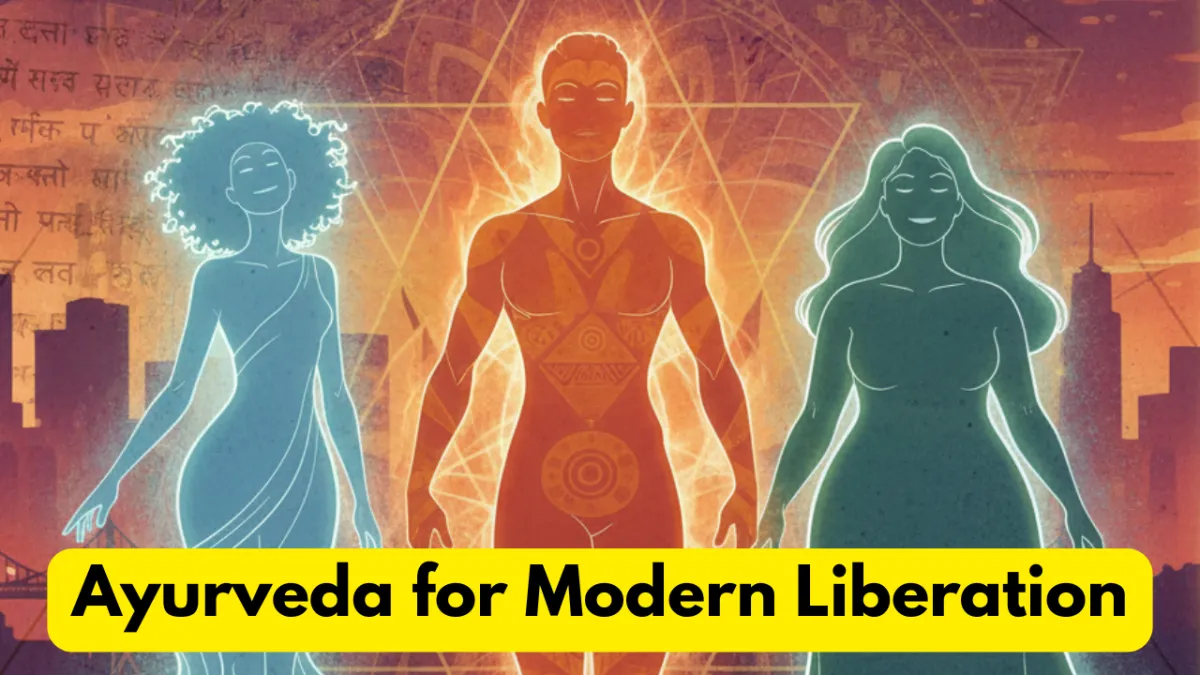
The Ancient Wisdom Your Ancestors Always Knew: Ayurveda for Modern Liberation
TL;DR
Ayurveda—a 5,000-year-old wellness system from India—teaches us that health is about harmony, not just absence of illness. It recognizes everyone’s unique constitution (dosha) and helps QTPOC, neurodivergent, and hypersensitive folks not conform to external boxes but to thrive as themselves. It offers tools to work with your nature (Vata, Pitta, Kapha), your rhythms, your environment, and your life context. Liberation includes honoring you — your patterns, your needs, your power.
Why Ayurveda Is an Ancient Map for Modern Liberation
The Wisdom We’ve Forgotten
Health is more than absence of disease; it’s about balance, harmony, and alignment.
Modern culture often pushes one size fits all: hustle, rigidity, “grind mode.” Ayurveda says: nah.
Unique Relevance for QTPOC & Neurodivergent Folks
Many systems fail to see difference, amplify norms. Ayurveda requires seeing difference.
For those whose minds or bodies are wired differently (ADHD, autism, HSP, etc.), Ayurveda offers individualized care, tuning in to your needs rather than pressing you into someone else’s mold.
The Doshas: Your Blueprint for Balance
Vata (Air + Space)
Qualities / When Dominant: Quick mind, irregular schedules, bursts of creativity, followed by feeling scattered or exhausted
What Helps You Thrive: Warm, grounding routines; gentle regularity; warm foods; rest; slow movement like yin yoga or grounding breathwork
Pitta (Fire + Water)
Qualities / When Dominant: Passionate, intense, driven, prone to burnout, irritability in heat or conflict
What Helps You Thrive: Cooling practices; balancing rest-work cycles; cooling foods; emotion regulation; shadow work around striving
Kapha (Earth + Water)
Qualities / When Dominant: Stable, nurturing, strong endurance; sometimes slower to start; can feel stuck or heavy
What Helps You Thrive: Energizing rituals; lighter foods; movement; morning sunlight; ways to wake up creativity; breaking inertia gently
Most of us carry all three, in different amounts. Your dosha balance shifts with seasons, stress, life changes. Learning to read your patterns = practicing compassionate alignment.
Ayurveda & Neurodivergence: A Radical Offering
ADHD / Vata-dominant patterns: When your mind is “on” all the time, Ayurveda’s grounding, warming, rhythm-building practices can reduce overwhelm.
Autism / Kapha tendencies: Deep processing, need for routine, sometimes sensory overwhelm. Practices that uplift energy, provide safe structure, and honor your tempo help.
Highly Sensitive People (HSP) & Pitta overload: Your sensitivity often dismissed as “too much”—Ayurveda shows how cooling, calming, protective practices become superpowers.
Holistic Context: You + Relationships + Time + Environment
Ayurveda doesn’t isolate you: your constitution interacts with seasons, times of day, diet, work, community, stress.
You’re not “broken” if you struggle—it might be a mismatch: the season, environment, or schedule not aligned to you.
Liberation is knowing when to adapt, when to influence, when to surrender.
“We also host global and local events where you can experience Ayurveda, breathwork, and sound healing in community. Check our events page to find what’s coming up.”
How to Start: Practices for Self-Discovery & Liberation
Self-Assessment – Notice when you feel lit up vs burnt out. Track your energy, moods, digestion, sleep over a week.
Align Rituals to Your Dosha – e.g. Vata → warm baths, gentle routines. Pitta → cooling herbs, rest breaks. Kapha → morning movement, lighter meals.
Tune to Natural Rhythms – Day/night cycles, seasons. Let the changing season guide changes in your routine, diet, clothing.
Compassionate Response – When stress or imbalance shows up: don’t force yourself through it. Support, kindness, recalibrate.
Experiment & Iterate – What feels good for someone else may not fit you. Ayurveda gives a map, but you walk your own path.
“If you’re ready to take these practices deeper and recalibrate your entire lifestyle in just one week, our 7 Day Reset is your guided entry point into Ayurvedic-inspired living.”
Why This Matters: Liberation & Self-Authority
In systems that say “normalize to me,” Ayurveda says: know yourself. That is power.
QTPOC, neurodivergent, and sensitive humans deserve health systems that see you, not just treat symptoms.
Freedom emerges when you stop forcing yourself into someone else’s box, and start dancing in the rhythms of you.
“You don’t have to walk this path alone. Our Energy of Creation community is a sanctuary for QTPOC, neurodivergent, and sensitive folks reclaiming their wellness and power together.”
What You Can Do Today
Start today: pick one small Ayurvedic practice aligned with your dominant dosha. Try it for a week.
Share what you discover: post, journal, reflect. Who knows — your journey might guide someone else.
Dive deeper: consider connecting with an Ayurvedic practitioner, doing a workshop, or reading foundational Ayurvedic texts.
FAQ
Q: What is a dosha?
A: A dosha is a mind-body constitution in Ayurveda. There are three: Vata (air & space), Pitta (fire & water), Kapha (earth & water). Everyone has all three to some degree; the balance shifts with time, environment, and lifestyle.
Q: How do I figure out my dosha?
A: Self-observation is key: look at your patterns (sleep, digestion, energy), your struggles (overwhelm, irritability, inertia), see what feels off vs what feels aligned. There are quizzes and practitioners, but your lived experience is your best guide.
Q: Can Ayurveda help neurodivergent people specifically?
A: Yes — because Ayurveda centers uniqueness. For example, someone with ADHD/Vata might benefit from grounding, regular routines, yoga, warm foods; someone with autism or Kapha traits might need motivating practices and gentle energizers; someone with Pitta-dominance might need cooling, rest, calm environments.
Q: Is Ayurveda rigid or about becoming perfect?
A: Not at all. It’s the opposite of rigid. It’s about curiosity, compassion, experimentation. The goal is your harmony, not a checklist of perfection.
Q: Do I need to follow all Ayurvedic rules or change everything?
A: Nope. Pick one or two small practices, try them, see how they land. Scale slowly. It’s a journey, not a coup d’état of self-regulation.
P.S. Ready for your next step? Recalibrate in our 7 Day Reset, join the Energy of Creation community, or come vibe with us at our upcoming events.


